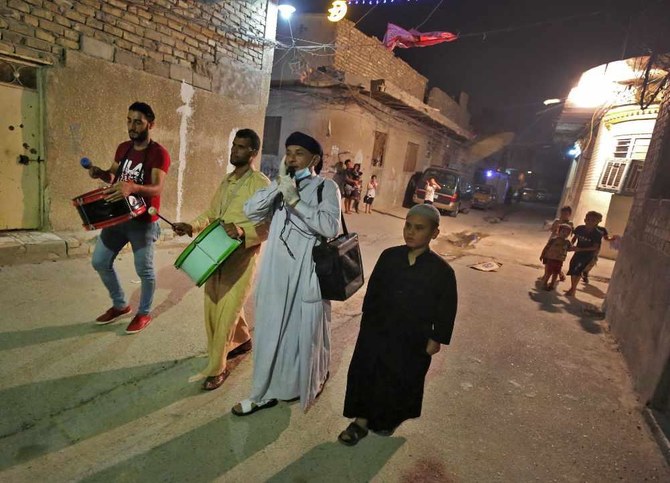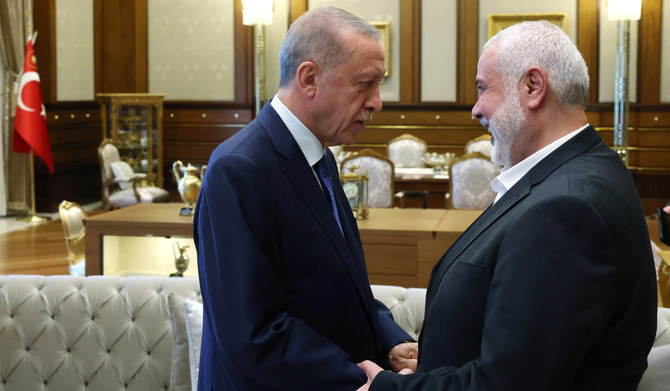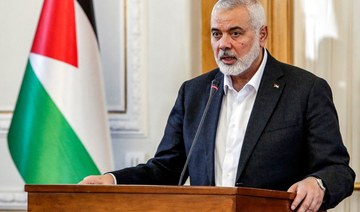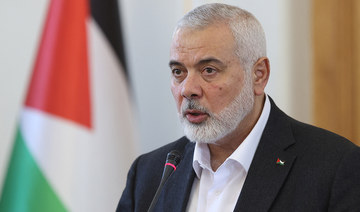BAGHDAD, Iraq: Baghdad, a city of nearly ten million residents, is running on an unusual rhythm this Ramadan since Iraq imposed an overnight curfew to curb the spreading coronavirus.
A few hours before dawn, the wailing voice of Sayyed Mozahem rings out across a small neighborhood in old Baghdad, amplified by his portable microphone.
Mozahem is the neighborhood “musaharati,” responsible during Ramadan for reminding Muslims to have their final meal before a new day of fasting begins with the sunrise.
“Fasters, wake up,” he chants, marching through the streets to the beat of his traditional drum as his older brother and father did before him.
But his refrains have a special twist: “May Ramadan keep the coronavirus away,” and “God, spare Iraq from COVID-19.”
Iraqis are adapting their Ramadan routines to fit a curfew from 5 p.m. until 5 am — the hours Baghdad usually comes alive with huge fast-breaking feasts, late-night runs for sweets and midnight mosque visits.
Instead, Iraqis are rushing through checkpoints before the lockdown starts, praying alone at home and baking traditional sweets usually bought in stores.
A somber and isolating mood has settled over the capital, where the response to the novel coronavirus has left its mark from dawn until dusk.
After Mozahem wraps up his pre-drawn call — technically a violation of the nighttime curfew — the sun rises over Baghdad, the second most populous Arab capital.
By noon the heat is bearing down on the streets, sending traffic police in search of slivers of shade. The call to prayer rings out from hundreds of mosques, urging Muslims to worship from home.
Soon after, it’s Moussa Al-Bedeiri’s turn.
Twice a day, the firefighter uses the megaphone on his firetruck to urge people to stay home, avoid gatherings and wash their hands regularly.
His throat and lips are cracked but as a devout Muslim Bedeiri refrains from drinking during the long sweltering days.
“As the coronavirus spread, our work has doubled. We had more sanitization campaigns and broadcasts of official guidelines through loudspeakers on the civil defense vehicles and at our center,” he tells AFP.
The blinding sun dims into a late-afternoon haze as 22-year-old Mortada zips through traffic on his motorcycle.
Strapped to the back are food packages that Mortada needs to deliver before the curfew begins.
Restaurants have been closed to patrons for around two months but as restrictions have eased, they have been permitted to open for home deliveries.
Mortada makes less than a half-dozen deliveries per day now, about a quarter of his usual haul during Ramadan.
The twin shocks of coronavirus restrictions and falling oil prices have hit Iraq hard, and may double the current poverty rate to 40 percent, the World Bank has predicted.
The sun is preparing to set, casting long shadows across the vast esplanade of Baghdad’s Abdelqader Al-Gailani mausoleum, where a revered Sufi figure is buried.
For the first time in his life, 70-year-old sheikh Yalmaz Youssef is seeing the shrine and attached mosque empty.
“Since the ‘70s and until this day, I have never seen the door of the holy shrine of Sheikh Abdelqader closed. But when I did, I cried,” Youssef tells AFP.
As dusk settles, the dainty garlands decorating the mosque light up and the sunset prayer — calling on Muslims to break their fast at home — echoes across the city.
Iraqis bite in to modest dinners at home with family, reminiscing about past elaborate meals where dozens of relatives, neighbors and friends were invited.
Instead of strolls through halogen-lit streets to pick up sweets or toys, they wile away the nighttime hours with card games or television.
On the nightly news broadcast, Iraqi channels announce the new coronavirus numbers: more than 3,600 cases across the country and over 130 deaths.
The numbers are rising faster now, a grim lead-up to the Eid Al-Fitr holiday — usually a joyful occasion for extended family gatherings.
As twilight approaches, a drum echoes through the darkened streets and the musaharati begins calling Muslims to their final pre-fast meal.
Baghdad’s new routine begins all over again.
In Baghdad’s new Ramadan rhythm, calls to pray and keep COVID-19 away
https://arab.news/m5yt3
In Baghdad’s new Ramadan rhythm, calls to pray and keep COVID-19 away

- Iraqis are adapting their Ramadan routines to fit a curfew from 5 p.m. until 5 am
Hamas chief Haniyeh arrives in Turkiye for talks

- Fidan said he spoke with Haniyeh, who lives in Qatar, about how Hamas — designated as a terrorist organization by Israel, the United States and the European Union — “must clearly express its expectations, especially about a two-state solution”
ISTANBUL: A leader of Palestinian militant group Hamas, Ismail Haniyeh, arrived in Istanbul Friday evening for talks with Turkish President Recep Tayyip Erdogan as the death toll in Gaza passed 34,000.
A statement from Hamas Friday said Erdogan and Haniyeh would discuss the conflict in Gaza, adding that the head of the group’s political bureau was accompanied by a delegation.
Middle East tensions are at a high after Israel’s reported attack on Iran and Gaza bracing for a new Israeli offensive.
Erdogan insisted on Wednesday that he would continue “to defend the Palestinian struggle and to be the voice of the oppressed Palestinian people.”
But talking to journalists on Friday, he refused to be drawn on the details on the meeting.
Turkish Foreign Minister Hakan Fidan was in Qatar Wednesday and said he spent three hours with Haniyeh and his aides for “a wide exchange of views in particular about negotiations for a ceasefire.”
Qatar, a mediator between Israel and Hamas, acknowledged Wednesday that negotiations to end hostilities in Gaza and liberate hostages were “stalling.”
Fidan said he spoke with Haniyeh, who lives in Qatar, about how Hamas — designated as a terrorist organization by Israel, the United States and the European Union — “must clearly express its expectations, especially about a two-state solution.”
Erdogan’s last meeting with Haniyeh was in July 2023 when Erdogan hosted him and Palestinian president Mahmud Abbas at the presidential palace in Ankara. Haniyeh had last met Fidan in Turkiye on January 2.
The war in Gaza started after Hamas’s unprecedented attack on Israel on October 7 that resulted in the deaths of about 1,170 people, mainly civilians, according to an AFP tally of official Israeli figures.
Militants also took about 250 hostages. Israel says around 129 are believed to be held in Gaza, including 34 presumed dead.
Israel’s retaliatory military campaign has killed at least 34,012 people, mostly women and children, according to Gaza’s Hamas-run health ministry.
Huge blast at military base used by Iraqi Popular Mobilization Forces, sources say

- PMF sources said the strikes targeted a headquarters of the PMF at the Kalso military base near the town of Iskandariya around 50 km south of Baghdad
BAGHDAD: A huge blast rocked a military base used by Iraq’s Popular Mobilization Forces (PMF) to the south of Baghdad late on Friday, two PMF and two security sources told Reuters.
The two security sources said the blast was a result of an unknown airstrike, which happened around midnight Friday.
The two PMF sources pointed out the strikes did not lead to casualties but caused material damage.
PMF sources said the strikes targeted a headquarters of the PMF at the Kalso military base near the town of Iskandariya around 50 km south of Baghdad.
Government officials did not immediately respond to a Reuters request for comment.
The PMF started out as a grouping of armed factions, many close to Iran, that was later recognized as a formal security force by Iraqi authorities.
Factions within the PMF took part in months of rocket and drone attacks on US forces in Iraq amid Israel’s Gaza campaign but ceased to do so in February.
Leaders of Jordan and Pakistan call UAE president to express concern about effects of severe storm

- Leaders passed on their best wishes to the country as it recovers from the storms
DUBAI: The president of the UAE, Sheikh Mohammed bin Zayed Al-Nahyan, received telephone calls from King Abdullah of Jordan and Pakistan’s Prime Minister Shehbaz Sharif on Friday, during which they expressed concern about the effects of the severe weather, including unusually heavy rainfall, that battered parts of the country this week.
They also passed on their best wishes to the country as it recovers from the storms and “conveyed their heartfelt hopes for the safety and prosperity of the UAE and its people, praying for their protection from any harm,” the Emirates News Agency reported.
Sheikh Mohammed thanked both leaders for their warm sentiments, and emphasized the strong bonds between the UAE and their nations.
The UAE and neighboring Oman were hit by unprecedented rainfall and flooding on Tuesday, with more than 250 millimeters of rain falling in parts of the Emirates, considerably more than is normally seen in a year. Dubai International Airport was forced to close temporarily when runways were flooded.
Peshmerga fighter dies in Turkish strike in north Iraq

JEDDAH: A member of the Kurdish Peshmerga security forces was killed on Friday in a Turkish drone strike in the autonomous Kurdistan region of northern Iraq.
Ankara regularly carries out ground and air operations in the region against positions of the outlawed PKK, the Kurdish separatist group that has waged a decades-long insurgency against the Turkish state.
The victim of Friday’s attack died in a drone strike on his vehicle, said Ihsan Chalabi, mayor of the mountainous Sidakan district near Iraq’s borders with Turkiye and Iran.
For decades, Turkiye has operated several dozen military bases in northern Iraq in its war against the PKK, which Ankara and its Western allies consider a terrorist group.
Both Baghdad and the Kurdish regional government have been accused of tolerating Turkiye’s military activities to preserve their close economic ties.
At the beginning of April, a man described as “high-ranking military official” from the PKK was killed in a Turkish drone strike on a car in the mountainous Sinjar region, according to the Kurdistan counterterrorism services.
Turkish President Recep Tayyip Erdogan is expected to visit Baghdad on Monday on his first official visit to Iraq since 2011.
Iraq’s Defense Minister Thabet Al-Abassi in March ruled out joint military operations against the PKK, but said that Turkiye and Iraq would “work to set up a joint intelligence coordination center.”
Middle East in ‘shadow of uncertainty due to regional conflicts’

WASHINGTON: Economies in the Middle East and North Africa face a “shadow of uncertainty” from ongoing tensions in the region, a senior IMF official said.
“We are in a context where the overall outlook is cast into shadows,” Jihad Azour, the International Monetary Fund’s director for the Middle East and Central Asia department, said in an interview in Washington.
“The shadow of uncertainty on the geopolitical side is an important one,” added Azour, a recent candidate for the next Lebanese president.
In the face of the ongoing conflicts in Gaza and Sudan and a recent cut to oil supplies by Gulf countries, the IMF has pared back its growth outlook for the Middle East and North Africa region once again.
FASTFACT
Economic activity in Gaza has ‘come to a standstill’ and the IMF estimates that economic output in the West Bank and Gaza contracted by six percent last year.
The IMF expects growth in MENA of 2.7 percent this year — 0.2 percentage points below its January forecast — before picking up again next year, the IMF said in its regional economic outlook report.
The risks to growth in the MENA region remain heightened, the IMF said, pointing to the danger of greater regional spillovers from the ongoing Israel-Gaza war.
“We have concerns about the immediate and lasting impact of conflict,” Azour said.
The IMF report said that economic activity in Gaza has “come to a standstill” and estimates that economic output in the West Bank and Gaza contracted by 6 percent last year.
The IMF said the report excludes economic projections for the West Bank and Gaza for the next five years “on account of the unusually high degree of uncertainty.”
The IMF cannot lend to the West Bank and Gaza because they are not IMF member countries.
However, Azour said it has provided the Palestinian Authority and the central bank with technical assistance during the current conflict.
“When we move into the reconstruction phase, we will be part of the international community support to the region,” he added.
Azour also discussed the situation in Sudan, where thousands have been killed in a civil war that has also devastated the economy, causing it to contract by almost 20 percent last year, according to the IMF.
“The country is barely functioning, institutions have been dismantled,” he said.
“And for an economy, for a country like Sudan, with all this potential, it’s important to stop the bleeding very quickly and move to a phase of reconstruction,” he added.
The recent Houthi attacks have particularly badly hit the Egyptian economy on Red Sea shipping, which caused trade through the Egypt-run Suez Canal to more than halve — depriving the country of a key source of foreign exchange.
Egypt reached an agreement last month to increase an existing IMF loan package from $3 billion to $8 billion after its central bank hiked interest rates and allowed the pound to plunge by nearly 40 percent.
A key pillar of the current IMF program is the privatization of Egypt’s state-owned enterprises, many of which are owned by or linked to the military.
“This is a priority for Egypt,” Azour said. Egypt needs to have a growing private sector and give space for the private sector to create more jobs.”
“We have an opportunity to re-engineer the state’s role, to give the state more responsibility as an enabler and less as a competitor,” he said.






















